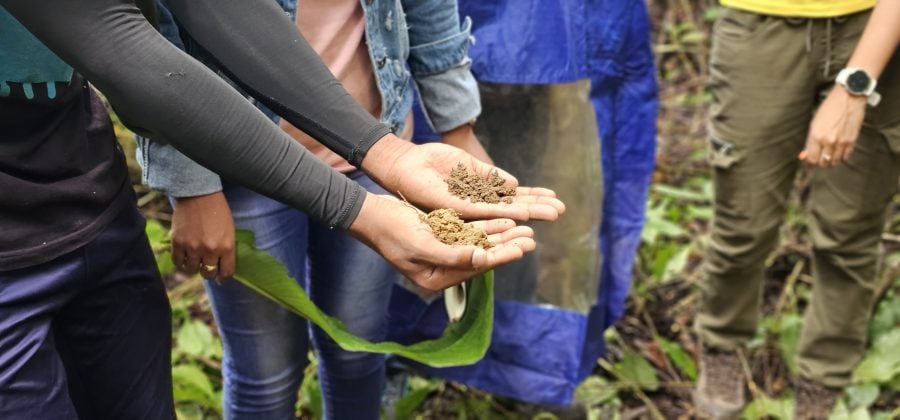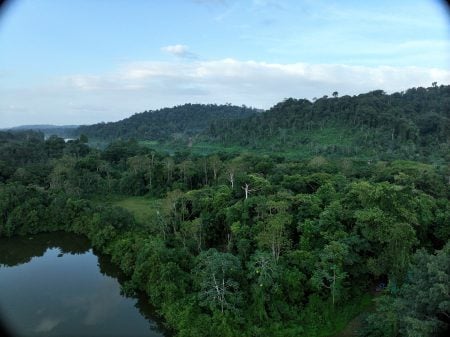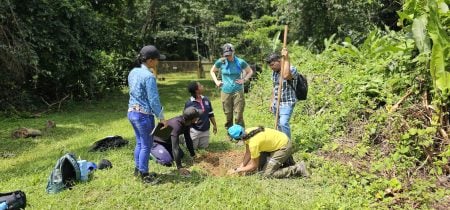
This February, Michigan Tech faculty traveled to Suriname to build connections and help train the next generation of scientists and researchers. Their trip was phase two of the U.S. Embassy-funded grant project focused on fostering sustainable development and promoting ethical research practices in the country. Suriname is also the home country for Wayne Gersie, Michigan Tech’s vice president for community engagement and professor of practice in the Department of Psychology and Human Factors in the College of Sciences and Arts.
“Ultimately, this partnership aims to serve as a model for international collaboration in forestry, environmental science, and technology-driven sustainable development,” said Gersie.
Located in the northern region of mainland South America, Suriname has 93% forest coverage and is one of three countries in the world with zero net carbon emissions. Its rich biodiversity, unique forest ecosystems, and local scientists and experts present excellent opportunities for collaboration and learning. Parth Bhatt, assistant professor of geospatial science in the College of Forest Resources and Environmental Science (CFRES), led workshops demonstrating the use of drones to gather geospatial data from the landscape on what is his third trip to Suriname.

“A major challenge the country faces is a shortage of highly trained professionals to help manage and preserve these resources effectively,” said Bhatt. “Strengthening educational and research collaborations can help bridge this gap by providing expertise in conservation, remote sensing and sustainable resource management.”
Michigan Tech’s collaborator Anton de Kom University Centre for Agricultural Research (CELOS) said they consider researchers and scientists an “endangered species” in Suriname. CELOS hopes the partnership with Michigan Tech will interest students to pursue a career in science, strengthen current faculty, and support sustainable development of both Surinamese people and their natural resources.
During the three days of workshops, Gersie presented on research ethics and responsibility in forestry and environmental science, along with Marika Siegel, associate provost for undergraduate education and dean of the Pavlis Honors College, and Darnishia Morris, assistant dean of Pavlis. CFRES faculty Tara Bal, assistant professor of forest health, Evan Kane, professor of soil science, and Xinfeng Xie, associate professor of forest biomaterials, provided field workshops on topics such as tropical forest management, conservation practices, and geospatial analysis. The workshops were held at Afobaka in the Brokopondo District in Suriname. Students from Anton De Kom University of Suriname and the Polytechnic University of Applied Sciences in Suriname attended each workshop.
“Building connections is absolutely necessary for developing research beneficial to all,” said Bal. “Instructors participate in novel ecosystem research while learning from each other. The students develop as early-career professionals by doing hands-on, field-based study.”

The partnership is also supported by collaboration with Staatsolie, Suriname’s national energy company. Michigan Tech continues to develop partnerships in Suriname with other organizations including the Foundation for Forest Management and Production Control, Apache Oil Group, TotalEnergies, the World Wildlife Fund, the United Nations Development Program, the Suriname Forest Service, and the Suriname Conservation Foundation, as well as stakeholders in the forestry, energy, and conservation sectors.
“These kinds of connections are invaluable to building research capacity and the experience and confidence of early career professionals, no matter where they are on the globe,” said Bal.
Moving forward, Michigan Tech faculty hope to continue building partnerships in Suriname, with long-term goals including joint funding opportunities, co-authored research and study abroad opportunities.
“We envision this partnership growing not only scientifically but also culturally—enhancing knowledge exchange, fostering student and faculty mobility, and strengthening conservation efforts in one of the world’s most ecologically significant regions,” said Bhatt, “By working together, we can create lasting educational and environmental impact.”
About the College of Forest Resources and Environmental Science
Michigan Tech’s College of Forest Resources and Environmental Science brings students, faculty, and researchers together to measure, map, model, analyze, and deploy solutions. The College offers six bachelor’s degrees in forestry, wildlife ecology and conservation, applied ecology and environmental science, natural resources management, sustainable bioproducts, and environmental science and sustainability. We offer graduate degrees in applied ecology, forest ecology and management, forest molecular genetics and biotechnology, and forest science.
Questions? Contact us at forest@mtu.edu. Follow us on Facebook, Instagram, and LinkedIn for the latest happenings.